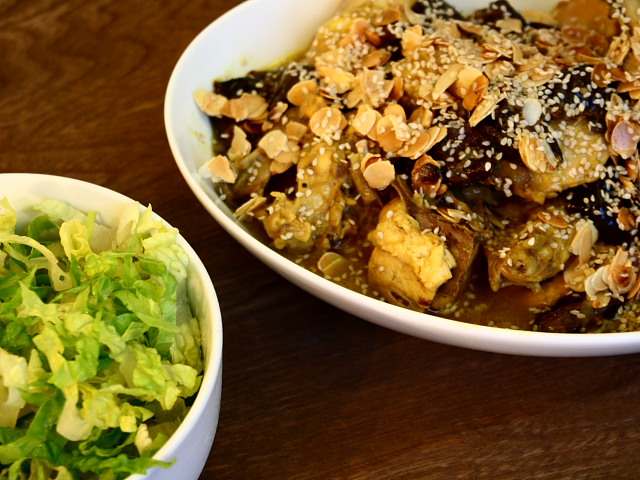Our go-to recipe for chicken stew type meals is normally a curry of some description, something from the sub-continent, or maybe South-East Asia, packed with garlic, ginger and spices.
I normally get quite fired up by the idea of making these types of dish, then realise that the list of ingredients is a foot long and the spices need to be roasted in a dry pan, the garlic and ginger needs to be obliterated in a food processor, this and that need to be cooked for ten minutes each… Suddenly, it turns into a performance instead of a quick dinner.
There’s no way around that for that type of food…it needs an investment of time and effort to make it happen.
This tajine, a Moroccan staple, is slightly different. It’s one pot cooking at its finest…just drop all the ingredients in a big pan, cover with water and let time and heat work its culinary magic.
Start with a chicken, jointed up into serving pieces. This means separating the drumsticks from the thighs, breaking the wings in two and cutting the breast into three chunks. I left the breast on the bone and sliced straight through it with a heavy knife. Bones in a slow cooked dish like this are always a bonus.
Put the chicken into a large pan and add a teaspoon each of turmeric and salt, a quarter teaspoon of saffron, half a teaspoon of ground black pepper, 50g of butter and a finely chopped onion. Cover with a pint of water, bring to the boil, cover the pan and reduce the heat to a simmer until the chicken is tender, about forty-five minutes to an hour.
At this point, add 225g of prunes, sliced in half and leave, uncovered, for another fifteen minutes, then add 50g of honey and cook through for another five minutes.
Serve with 50g of sliced almonds that you’ve browned slightly in a frying pan with a little oil and a big tablespoon full of sesame seeds.
It’s a very simple dish, but it has a superb depth of flavour and a wonderful sweetness that’s characteristic of the food of the Maghreb. There’s nothing difficult about this type of food, and it fits in well with the demands of a busy life…there’s only a little over an hour’s cooking here, and I suspect it would work well in a slow cooker, too.
This is from North African Cookery by Arto Der Haroutunian.

